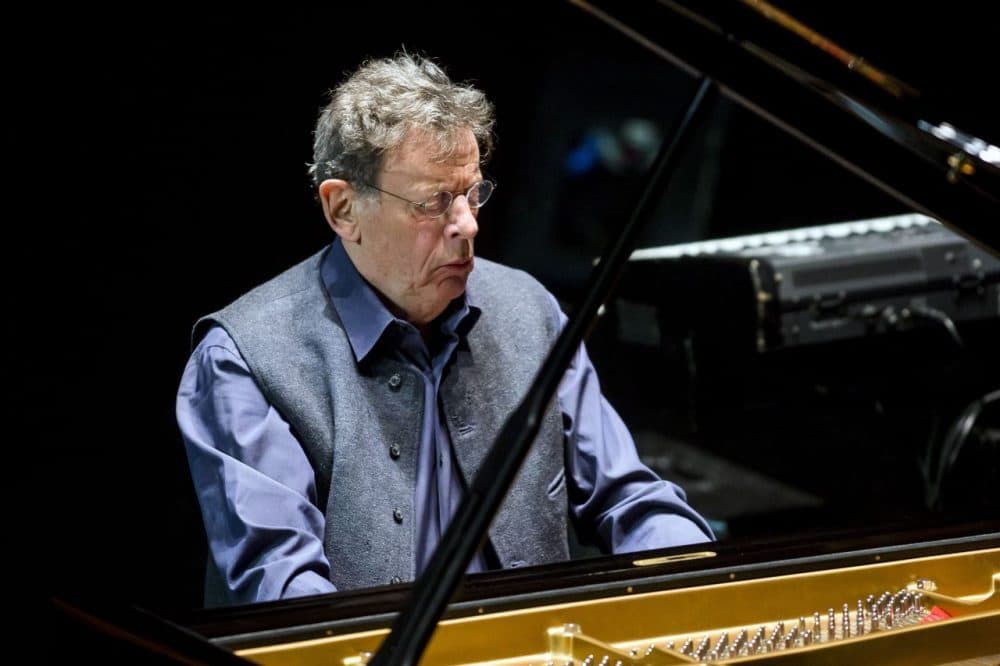Advertisement
Composer Philip Glass On How His 'Way Of Hearing' Transformed

Philip Glass is one of those composers for whom, all it takes is just a few notes to recognize his work.
He is the master of minimalism, though Glass himself doesn't like the term. He prefers describing himself as a composer of "music with repetitive structures."
Glass is prolific. He's composed dozens of operas — his most famous is arguably "Einstein on the Beach" — symphonies and film scores. If you've seen "The Hours" or "The Fog of War," you've heard Philip Glass. His new memoir is called "Words Without Music" — a curious title for a composer.
Guest
Philip Glass, composer and author of "Words Without Music: A Memoir."
Highlights
On the title of his new memoir, "Words Without Music":
Philip Glass: "Any artist will tell you...that their work, in the end, is autobiographical - whoever we are, whatever we paint, whatever we do. As a friend of mine [says], 'In a lifetime, we stand revealed.' We stand reveled.'"
On listening to music with his father, growing up:
PG: "I wasn't supposed to be awake, you see. I was in the upstairs bedrooms and...he would get home from work late and he would eat dinner and then he would listen to music. He had a little radio shop — a record shop — in Baltimore, Maryland. He would listen to music, and I was on the stairs listening with him. I never knew whether he was aware that I was actually there, but we listened to music together for years...He was not a trained musician by any means, but he ended up being a great fan of chamber music, most of the classics — Schubert, Beethoven, Mozart's quartets — that kind of thing. And I can say, one thing that I am very pleased about, when I was in my 30s and I was down visiting in Baltimore, I discovered that my first record was in the classical section, under G."
On his education and childhood:
PG: "I wasn't the kind of guy that got into fights, and there was only one fight and it never happened again, after that...The family, we didn't have a lot of money, but my mother was a schoolteacher. She was an English teacher. And there was a kind of pride in education that came through her. I discovered later — I went to the University of Chicago at [a] very young [age]. I was 15 when I went and I always wondered why — or how — they let me do that...I was just a 15-year-old kid. But they did. And, later — many, many years later, I was talking to my sister and I said, 'Why do you think they let me go to Chicago then?' And she said, 'Well, Ida,' — that was our mother's name — 'Ida wanted you to go.' She said, 'Ben,' — that was my father — she said, 'Ben was against it but Ida insisted you go.' Isn't that amazing?"
On taking the train from Chicago to Baltimore:
PG: "This is the old B&O railroad, and it was an overnight train. So, in those days, there were no amenities on trains at all, there was no lights on at night, there was no club car where you could get a cup of coffee or anything like that. You just made friends with the night, that's what you did. The rhythm of the wheels hitting the tracks — the clickity clack, clickity clack — that's what you heard. Years later, I heard rhythms that sounded like that and I think that, actually, the music of the trains became a kind of soundtrack for me as a very young guy. It's built into the way I listened then and it's still there."
On people who dislike or don't understand his music:
PG: "I understand that they are not hearing the music. I mean, when I was a young guy, I walked into a museum and I saw, for the first time, a painting by Frank Stella. And I had been brought up looking at Jackson Pollack. Suddenly, everything was different and, at first, I couldn't see the painting. I couldn't see it for what it was because I was immersed in something else. And I think that's what happens, very often, with the music we love. [It] becomes the music we know and the music we know becomes the music we love and so that when something comes along that steps out in a different way, you literally cannot hear it. So, when someone says 'the needle's stuck in the groove,' I say, well, actually, their mind is stuck in the groove. Either they'll get it eventually or they wont."
More
The Independent: Words Without Music By Philip Glass, Book Review: Songs In The Key Of Modern Life
- "The one-time taxi driver's journey to becoming the genius who composed the soundtrack to our times is well worth the fare, says Boyd Tonkin."
This segment aired on March 30, 2015.